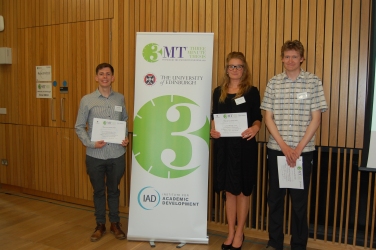Erasmus+ funding available – any subject area!
Going abroad isn’t just for undergraduates or language students. Find out how you could go abroad as part of your Research Masters or PhD – and get funded to do it.
PhD and Research Masters students can apply for Erasmus+ grants worth between €400-450 month, to help you undertake work or research abroad. As the funding is towards your travel and living expenses, it isn’t restricted to a particular activity or subject area; it just has to be in an Erasmus+ programme country, and last between 2 and 12 months.
Some examples of what you could do with the funding are:
- A supervised research placement at another university, at an institute, or with an expert in your field of specialisation
- Field work for data collection, or to test your research findings
- Hands-on experience in a laboratory or specialised organisation
- Using your expertise as a specialist within a work organisation
Erasmus + funding is available for both paid and unpaid placements, and you can still get it if you’re receiving a salary, PhD bursary, or student loan. Already received Erasmus+ funding during your undergraduate degree? Don’t worry, you’re still eligible!
Applications are open year-round. For full eligibility criteria and to find out more, visit https://www.ed.ac.uk/global/go-abroad/work-abroad.
Any questions? Email workplacements@ed.ac.uk or pop into the Go Abroad Office on central campus for our weekly drop-in sessions – Tuesdays 2-4pm and Thursdays 10am-12pm.





 The University of Edinburgh 3 Minute Thesis Competition final took place on 22nd June 2018. Nine finalists from Three Colleges competed to deliver the best research presentation in 3 minutes with 1 slide.
The University of Edinburgh 3 Minute Thesis Competition final took place on 22nd June 2018. Nine finalists from Three Colleges competed to deliver the best research presentation in 3 minutes with 1 slide.
 Audience tickets are now available for the University of Edinburgh 3 Minute Thesis Competition Final on the 22nd June 2018. The Three Minute Thesis competition requires doctoral researchers to compete to deliver the best research presentation in just 3 minutes and one slide. Nine finalist from three Colleges will present a compelling presentation on their research topic and its significance in just three minutes.
Audience tickets are now available for the University of Edinburgh 3 Minute Thesis Competition Final on the 22nd June 2018. The Three Minute Thesis competition requires doctoral researchers to compete to deliver the best research presentation in just 3 minutes and one slide. Nine finalist from three Colleges will present a compelling presentation on their research topic and its significance in just three minutes.